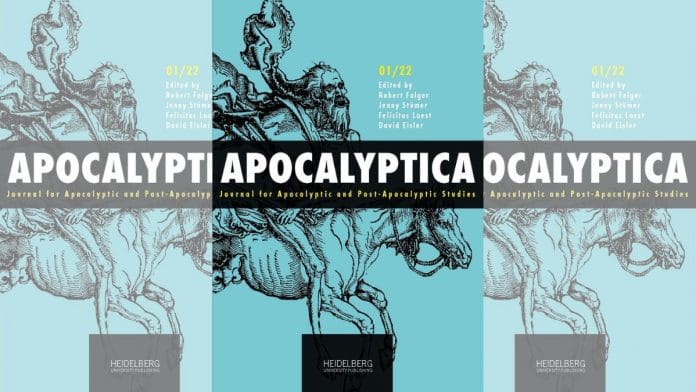New Delhi: In a first for academia, the Heidelberg University in Germany has released Apocalyptica, an open-access journal on “apocalyptic and post-apocalyptic studies”.
The first issue of our open-access journal Apocalyptica is finally out ? We are excited about the broad range of intellectual work and the thought-provoking contributions in this issue. Come read up about the end of the world ? https://t.co/ymrYOIxm6d pic.twitter.com/VW7tv5hQPu
— Centre for Apocalyptic & Post-Apocalyptic Studies (@CAPASHeidelberg) September 12, 2022
“We are excited about the broad range of intellectual work and the thought-provoking contributions in this issue. Come read up about the end of the world,” the university’s Centre for Apocalyptic & Post-Apocalyptic Studies (CAPAS) tweeted earlier this week.
According to CAPAS Managing Director Felicitas Loest and researcher Jenny Stümer, the reasoning behind Apocalyptica’s release is manifold — accelerating climate change, refugee crises caused by the Ukraine war, starvation caused by Saudi Arabia’s war in Yemen and natural disasters such as the floods in Pakistan.
“We are faced with a plethora of catastrophes; a cataclysm of apocalyptic scenarios all of which propose the unravelling of a destructive way of inhabiting the Earth, or an anti-relational refusal of the (common) world, while constantly doubling down on the gendered, raced, colonial, and environmental violence that have impelled these devastating patterns in the first place,” Loest and Stümer wrote.
According to the CAPAS researchers, the potential apocalypse-like conditions created by adverse events pose a central research question on “what it meant, means, and will mean to live through the end times”.
“Apocalypse as a mode of thinking, writing and working together teaches us about the limits and potentialities of ‘world’, ‘worlds’, and ‘worlding’; raising questions about what it means to think with, against and beyond the end today,” Loest and Stümer wrote.
Also read: Nuclear fusion reactor reaches 100 Million C for 30 secs. Here’s what it means for the future
Six research articles
The inaugural volume of the Apocalyptica journal includes a preface on the “archaeologies of apocalypse”, six research articles exploring various aspects of this new field of study, a review of books such as Brian Greene’s Until the End of Time: Mind, Matter, and the Search for Meaning in an Evolving Universe (2020) and Katie Mack’s The End of Everything (Astrophysically Speaking) (2020), and a special lecture given by Slovenian philosopher Slavoj Zizek.
Titled ‘From catastrophe to apocalypse… and back’, the Zizek lecture in particular kicks things off for apocalypse and post-apocalypse studies, as he states that “multiple catastrophes” are currently “competing for primacy”.
In doing so, Zizek introduces a theoretical argument distinguishing catastrophes from apocalypses, citing examples from various philosophers to talk about the role of digitisation and social media in exacerbating certain apocalyptic conditions.
The six research articles and the review of the books also break down other such theoretical questions surrounding ideas on the “end” of the world, with parallels drawn between contemporary society, pop culture as well as the field of astronomy.
Also read: To seek or not to seek aid? How India, Pakistan have dealt the question — Bhuj to Sindh






